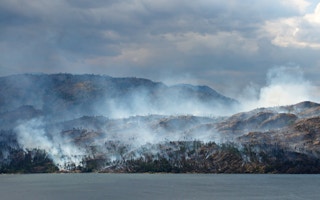This summer – with its record temperatures, deadly floods, and raging wildfires, which in Canada alone destroyed the equivalent of all the trees in Germany – might have felt like a final warning: without urgent and drastic action, the current climate emergency will become an inescapable climate disaster. Some might be tempted to think that we have reached a point when our only chance of mounting a sufficiently rapid and potent response to the threat is to embrace decisive state authority, even outright authoritarianism. But the notion that ecologically minded authoritarians will outperform democratic leaders on climate is a dangerous fantasy.
Concerns about democracies’ capacity to act swiftly and efficiently are nothing new. Government that allows all to participate (in theory, if not always in practice) makes for an imperfect and slow-moving system. Influential players can often veto actions that the majority supports. On the other hand, the view that irrational masses wield too much power – long expressed sotto voce – has become entirely salonfähig in the age of Donald Trump. For example, voters tend to punish politicians for taking measures to prevent catastrophes, and reward them for appearing heroic during a disaster, even though disaster relief is far more expensive than prevention.
In addition to well-known prejudices – many as old as Plato’s writings – one can argue that some of democracy’s benefits do not count for much in the climate emergency. Democracies pride themselves on the fact that every decision can be revisited – that policies can be updated and improved, and that the losers in one election can become winners in the next (and thus have reason to keep playing the democratic game). But climate-related decisions have major, irreversible consequences, so even if bad choices – such as doing too little – are revisited later, serious damage will have been done.
Other contemporary criticisms are blunter. Democracies are based on compromise, but bargains often turn out to be incoherent, especially in multi-party systems, because too many different political players want to get their way. Germany’s current governing coalition would appear to be a case in point. Correcting such incoherence takes time, which democracies might have under normal circumstances, but certainly do not have when the planet is becoming hotter and more apocalyptic practically by the day.
Another key concern stems from the de facto dominance of business interests in capitalist democracies. Given that climate action will inevitably harm at least some capitalists’ interests, these interests seem likely to prevent the necessary steps from being taken in time – or perhaps ever.
Now, with the climate crisis escalating fast, unabashed calls for more authoritarian decision-making are increasing. Some advocate a more technocratic approach, and hold up China as a shining example. (The irony that China is the world’s largest greenhouse-gas emitter is apparently lost on them.) Others – notably, the Swedish thinker Andreas Malm – envision a novel form of Leninism-cum-War Communism.
These proposals raise obvious questions, which their proponents never quite address. If, for the sake of climate action, power is concentrated in the hands of a state that does not answer to the people, what would prevent abuses of that power? Why, in the absence of any mechanisms of accountability, would an authoritarian regime actually tackle climate change at all? Does one really expect the powerful interests that are currently impeding climate action not to be just as powerful, if not more so, under a climate-autocracy?
Authoritarian regimes are notoriously corrupt. So, the notion that such a system would be free of “special interests,” and run by neutral, rational technocrats, is implausible. In fact, far from bolstering climate action, a shift toward authoritarian-style decision-making would likely make things worse.
Climate authoritarianism might also backfire in less obvious ways. In a polity with any amount of freedom, opposition is inevitable. If the authorities deem new restrictions necessary to quell criticism or resistance, they may well end up eroding other basic freedoms, including the freedom to produce and exchange potentially transformative ideas.
Imagine this. A group of climate scientists decry the climate dictator’s policies as insufficient and try to mobilise others to demand stronger action. In an attempt to restore “order,” the dictator imposes measures that curtail academic freedom and freedom of association. Now, not only are experts less able to influence the state’s climate response; they might not have opportunities to develop or share ideas and innovations that could enhance our collective ability to meet the climate challenge.
True, none of this necessarily means that democratic systems are particularly well-equipped to advance climate action. Instead, one might conclude that there are no good political instruments at all. But this neglects a key point: the obstacles to effective climate action in today’s democracies are not inherent. On the contrary, they are inconsistent with democratic ideals, and in a well-functioning democracy, should be removed.
The fossil-fuel industry’s disproportionate influence on the political process, for example, is not only damaging to the environment; it is also fundamentally undemocratic. Even without the urgent need to address the climate emergency, citizens would have good reason to demand change. The conclusion is clear: if we do not get serious about the climate emergency, we will not save democracy, and if we do not take democratic ideals seriously, we will not save the climate.
Jan-Werner Mueller, Professor of Politics at Princeton University, is the author, most recently, of Democracy Rules (Farrar, Straus and Giroux, 2021; Allen Lane, 2021).
Copyright: Project Syndicate, 2023.
www.project-syndicate.org









